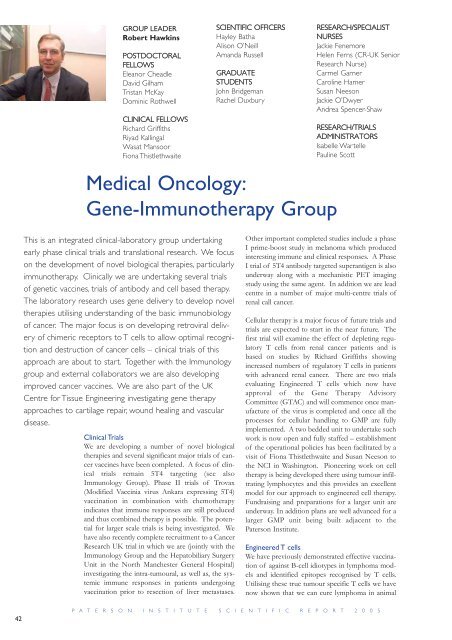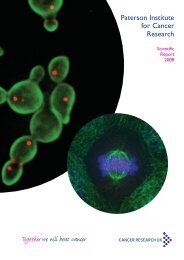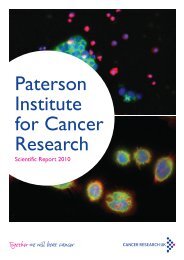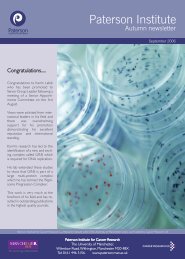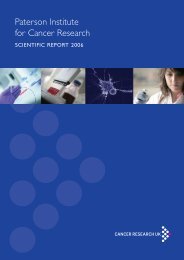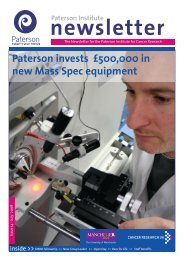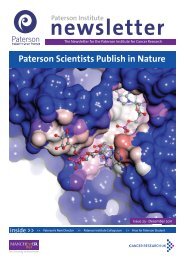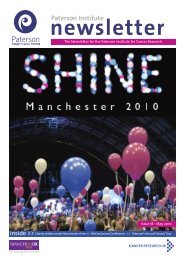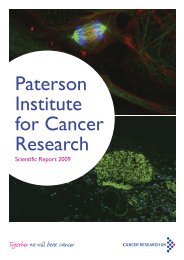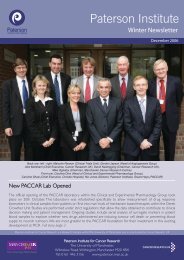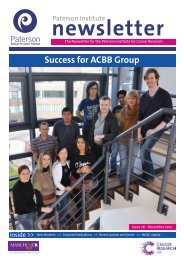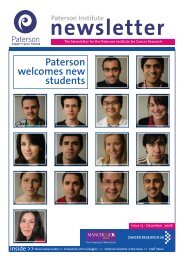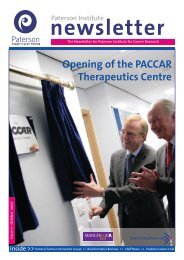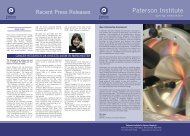Paterson Institute for Cancer Research SCIENTIFIC REPORT 2005
Paterson Institute for Cancer Research SCIENTIFIC REPORT 2005
Paterson Institute for Cancer Research SCIENTIFIC REPORT 2005
You also want an ePaper? Increase the reach of your titles
YUMPU automatically turns print PDFs into web optimized ePapers that Google loves.
42<br />
GROUP LEADER<br />
Robert Hawkins<br />
POSTDOCTORAL<br />
FELLOWS<br />
Eleanor Cheadle<br />
David Gilham<br />
Tristan McKay<br />
Dominic Rothwell<br />
CLINICAL FELLOWS<br />
Richard Griffiths<br />
Riyad Kallingal<br />
Wasat Mansoor<br />
Fiona Thistlethwaite<br />
Medical Oncology:<br />
Gene-Immunotherapy Group<br />
This is an integrated clinical-laboratory group undertaking<br />
early phase clinical trials and translational research. We focus<br />
on the development of novel biological therapies, particularly<br />
immunotherapy. Clinically we are undertaking several trials<br />
of genetic vaccines, trials of antibody and cell based therapy.<br />
The laboratory research uses gene delivery to develop novel<br />
therapies utilising understanding of the basic immunobiology<br />
of cancer. The major focus is on developing retroviral delivery<br />
of chimeric receptors to T cells to allow optimal recognition<br />
and destruction of cancer cells – clinical trials of this<br />
approach are about to start. Together with the Immunology<br />
group and external collaborators we are also developing<br />
improved cancer vaccines. We are also part of the UK<br />
Centre <strong>for</strong> Tissue Engineering investigating gene therapy<br />
approaches to cartilage repair, wound healing and vascular<br />
disease.<br />
Clinical Trials<br />
We are developing a number of novel biological<br />
therapies and several significant major trials of cancer<br />
vaccines have been completed. A focus of clinical<br />
trials remain 5T4 targeting (see also<br />
Immunology Group). Phase II trials of Trovax<br />
(Modified Vaccinia virus Ankara expressing 5T4)<br />
vaccination in combination with chemotherapy<br />
indicates that immune responses are still produced<br />
and thus combined therapy is possible. The potential<br />
<strong>for</strong> larger scale trials is being investigated. We<br />
have also recently complete recruitment to a <strong>Cancer</strong><br />
<strong>Research</strong> UK trial in which we are (jointly with the<br />
Immunology Group and the Hepatobiliary Surgery<br />
Unit in the North Manchester General Hospital)<br />
investigating the intra-tumoural, as well as, the systemic<br />
immune responses in patients undergoing<br />
vaccination prior to resection of liver metastases.<br />
<strong>SCIENTIFIC</strong> OFFICERS<br />
Hayley Batha<br />
Alison O’Neill<br />
Amanda Russell<br />
GRADUATE<br />
STUDENTS<br />
John Bridgeman<br />
Rachel Duxbury<br />
RESEARCH/SPECIALIST<br />
NURSES<br />
Jackie Fenemore<br />
Helen Ferns (CR-UK Senior<br />
<strong>Research</strong> Nurse)<br />
Carmel Garner<br />
Caroline Hamer<br />
Susan Neeson<br />
Jackie O’Dwyer<br />
Andrea Spencer-Shaw<br />
RESEARCH/TRIALS<br />
ADMINISTRATORS<br />
Isabelle Wartelle<br />
Pauline Scott<br />
Other important completed studies include a phase<br />
I prime-boost study in melanoma which produced<br />
interesting immune and clinical responses. A Phase<br />
I trial of 5T4 antibody targeted superantigen is also<br />
underway along with a mechanistic PET imaging<br />
study using the same agent. In addition we are lead<br />
centre in a number of major multi-centre trials of<br />
renal call cancer.<br />
Cellular therapy is a major focus of future trials and<br />
trials are expected to start in the near future. The<br />
first trial will examine the effect of depleting regulatory<br />
T cells from renal cancer patients and is<br />
based on studies by Richard Griffiths showing<br />
increased numbers of regulatory T cells in patients<br />
with advanced renal cancer. There are two trials<br />
evaluating Engineered T cells which now have<br />
approval of the Gene Therapy Advisory<br />
Committee (GTAC) and will commence once manufacture<br />
of the virus is completed and once all the<br />
processes <strong>for</strong> cellular handling to GMP are fully<br />
implemented. A two bedded unit to undertake such<br />
work is now open and fully staffed – establishment<br />
of the operational policies has been facilitated by a<br />
visit of Fiona Thistlethwaite and Susan Neeson to<br />
the NCI in Washington. Pioneering work on cell<br />
therapy is being developed there using tumour infiltrating<br />
lymphocytes and this provides an excellent<br />
model <strong>for</strong> our approach to engineered cell therapy.<br />
Fundraising and preparations <strong>for</strong> a larger unit are<br />
underway. In addition plans are well advanced <strong>for</strong> a<br />
larger GMP unit being built adjacent to the<br />
<strong>Paterson</strong> <strong>Institute</strong>.<br />
Engineered T cells<br />
We have previously demonstrated effective vaccination<br />
of against B-cell idiotypes in lymphoma models<br />
and identified epitopes recognised by T cells.<br />
Utilising these true tumour specific T cells we have<br />
now shown that we can cure lymphoma in animal<br />
P A T E R S O N I N S T I T U T E S C I E N T I F I C R E P O R T 2 0 0 5


